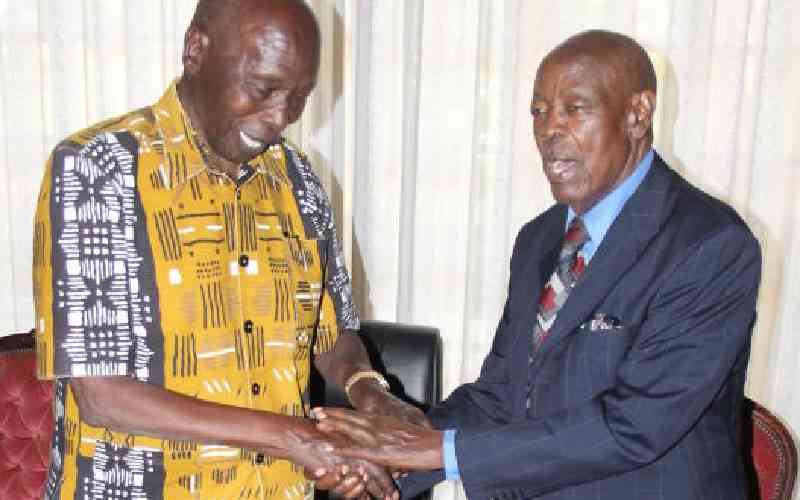
Deputy Public Prosecutor James Boro Karugu, a long-serving and loyal senior officer in the Attorney General's chambers, was the first choice of his long-serving boss, Charles Mugane Njonjo, to succeed him once he left office to enter politics and become the Member of Parliament (MP) for Kikuyu.
Njonjo did not have the powers to appoint, but as one of the most influential members of then president Daniel Moi's kitchen cabinet, and the immediate former holder of the office, it is most likely Moi appointed Karugu on Njonjo's advice.
In Karugu, Njonjo saw a man he had mentored through the ranks and a village-mate he could easily use to further his agenda. But Karugu, who died on Wednesday aged 85, was an ethical professional who would not be pushed around.
Karugu's brief sojourn at the AG's chambers would be marked by three main events: a 'shoot to kill' order decreed by his predecessor, the Frank Sundstrom murder case, and the Andrew Muthemba treason case.
Njonjo, a man who had enjoyed immense power in his years as AG, left Karugu, one of his home boys (both came from Kiambu, and specifically Kabete), in a dilemma. Njonjo had just instructed the police to shoot violent robbers on sight; a directive that was vehemently opposed by some legislators.
MPs wanted to know how such an order would be carried out without trigger-happy police officers killing innocent Kenyans. Instead of clarifying this matter, Njonjo dropped it in Karugu's lap when he left office. But Karugu, a professional and ethical lawyer, neither rescinded nor endorsed the order.
He instead issued a ministerial statement in Parliament cautioning against "...the use of firearms by trigger-happy policemen". In the same statement, however, he defended the right of policemen to resort to the use of "...such force as is necessary to apprehend a criminal or prevent the commission of crime".
This statement watered down Njonjo's 'shoot to kill' order and made Karugu the darling of MPs. The public was also wary of the extrajudicial actions of a trigger-happy police force under the pretext of such orders.
As Attorney General, Njonjo was in no particular hurry to replace the white bench with a black bench. During his tenure that ran for three decades from independence to 1980, the High Court, and Court of Appeal, were mainly the preserve of European judges. It was before one such judge that an American sailor, Frank Joseph Sundstrom, appeared over the brutal murder of Monica Njeri in Mombasa in 1980. The case raised a hue and cry and drew a lot of publicity locally and abroad. Kenyans demanded justice for Njeri and hoped for execution of the American, or at least a life sentence. On its part, the United States government exacted pressure on Kenya to release its citizen, the shocking murder notwithstanding.
But Justice Leslie Harris downgraded the murder charge to manslaughter. Kenyans would be most dismayed when the judge handed Sundstrom the incredulous penalty of signing a bond promising to pay Sh500 "...if he failed to maintain good behaviour in the next two years".
In those days, criticising the Judiciary or its officers, especially judges, was unheard of; but this did not stop Karugu.
He censured Harris on this sentence that was an obvious perversion of justice. When the matter went to Parliament, MP Kimani wa Nyoike asked the AG whether he was satisfied that justice had been done in the Sundstrom case.
Karugu said he wasn't, on both counts. The white bench was clearly outraged by Karugu's sterling performance in Parliament; he had shown that he was his own man and was committed to maintaining the Rule of Law. Karugu's many acts, perceived as defiance, sealed his fate as a marked man and after 15 months on the job, Karugu abruptly resigned.
President Moi accepted his resignation and appointed Joseph Kamere, the first Attorney General from the private sector, to replace him. Karugu, who quit quietly, did not issue a statement about his resignation. Retreating to his Kiamara Coffee Estate near Kiambu town, Karugu went down in Kenyan history as the shortest-serving Attorney General.
He did, however, manage to contribute to Kenya's legal map. It was during his tenure as AG that the Land Control Act was introduced. The Act mandated elders to handle rural land disputes. He also introduced the Civil Procedure Act that enacted the re-hearing of civil appeals. Also under his watch the manufacture, supply and selling of chang'aa was banned.
Karugu was born in 1937 in Chura village in Kabete, just a few kilometres from Njonjo's home village of Mararo. He attended Mang'u High School before joining Ohio State University in the USA between 1958 and 1962 to study History and Political Science.
He qualified as a barrister-at-law after graduating with a BA degree from Lincoln's Inn London in 1964. Once back in Kenya, he started working at the Attorney-General's chambers where he was promoted to Senior State Counsel in 1967. He would later become Deputy Director of Prosecutions (DPP) in 1970.
 The Standard Group Plc is a multi-media organization with investments in media platforms spanning newspaper print
operations, television, radio broadcasting, digital and online services. The Standard Group is recognized as a
leading multi-media house in Kenya with a key influence in matters of national and international interest.
The Standard Group Plc is a multi-media organization with investments in media platforms spanning newspaper print
operations, television, radio broadcasting, digital and online services. The Standard Group is recognized as a
leading multi-media house in Kenya with a key influence in matters of national and international interest.

